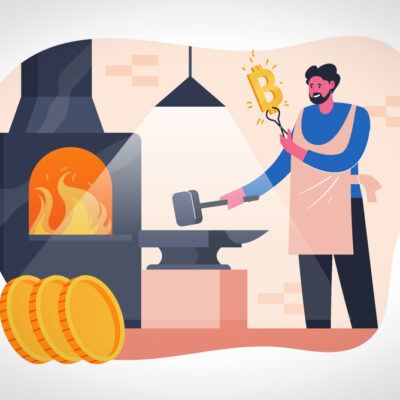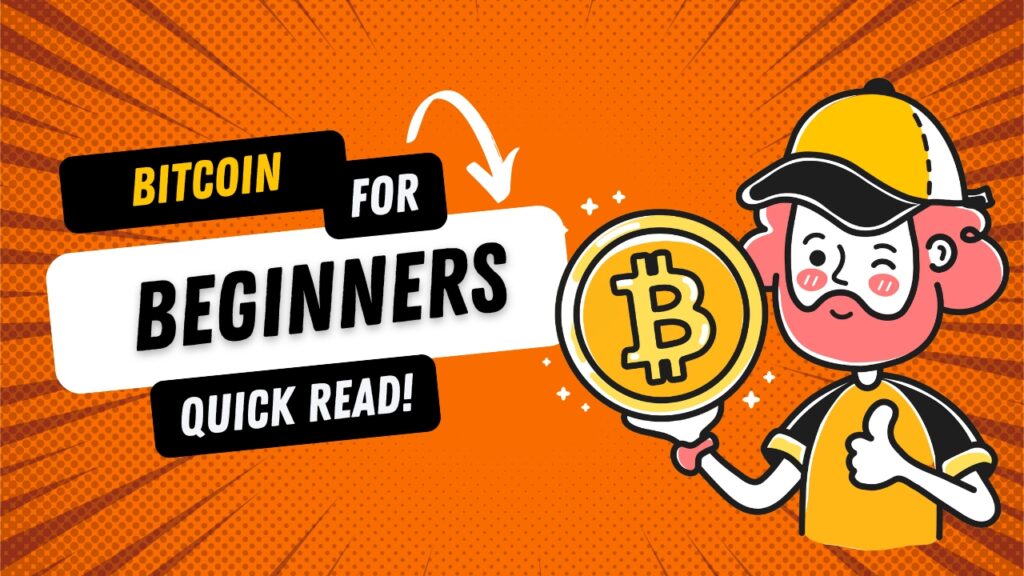
If you keep your money in cash, you are guaranteed to lose purchasing power over time. Official inflation remains somewhere between 1% and 5%, depending on who you ask, but some estimates that include things like property, commodities, and luxury goods put inflation at 15% or more. Whichever number you believe, the compounding effect on your savings account is terrible.
Just 2% inflation over 10 years means you lose 20% purchasing power. If you look at the earnings over a lifetime, saving money during your 20s and 30s means that by the time you retire in 30 years, that money will lose more than 60% of its purchasing power. Put another way, your savings account will deflate to almost zero value over your lifetime. That’s why so many people turn to investing in assets that retain value in a way that outpaces inflation. Traditionally, that’s been stocks and real estate.
Now, a new asset has entered the ring. Bitcoin has arrived. No longer just magic internet money for criminals and nerds, Bitcoin is held by a wide variety of people around the world. Everyone from local street vendors in El Salvador, to publicly held companies listed on the US stock market are getting value from holding and transacting in bitcoin. If you are considering taking your money out of cash and putting it into another vehicle to grow your wealth, then you should seriously consider Bitcoin as an option.
For me, Bitcoin is THE thing to own for the next few decades. In my view, the relative risk to reward is something we won’t ever see again in our lifetimes, so it makes owning a little bitcoin a no-brainer.
However, every investor is different. You should invest according to your risk profile and your goals. As someone with a bit of experience in stocks and real estate, and a lot of experience in Bitcoin, I wanted to compare the pros and cons of all three. What do you think is the best place to put your money for the next few decades?
Pros & Cons For Bitcoin, Real Estate, & Stocks
Here’s the breakdown of the pros and cons of owning each asset, as I see it. If I leave anything off, feel free to leave your own pros and cons in the comment area!
Pros & Cons For Bitcoin

Pros
- easy and instant to buy with apps like CashApp or Strike
- easy to self-custody (true ownership) in comparison with other investments
- very portable
- highly liquid and easy to exchange with others (24/7/365)
- divisible down to fractions of a penny (satoshi) and can be used for micropayments online
- 200% CAGR
- cannot be diluted or debased
- can buy a fraction of a bitcoin (satoshi)
- easy to identify as the only viable cryptocurrency long term
Cons
- requires some personal interest to learn & understand
- short history of existence (returns)
- many unknowns about the future
- self-custody requires responsibility
- nobody wants to talk to you about bitcoin
Related Content
Pros & Cons For Real Estate

Pros
- passive income with rental income
- “guaranteed” increase in value over time for many areas
- cash out refinance is tax-free money
- diversification across jurisdictions can reduce risk
- house flipping is a great hands-on hobby
- easy to visualize and understand for most people
- easy to use responsible leverage (20% down payment)
Cons
- costly to start when buying actual property (not REITs)
- repairs and maintenance expenses easily eat into profits
- competitive
- high transaction costs on both front and back end
- taxes and insurance required
- illiquid
- some areas may require a higher level of expertise to be profitable
- risk of legal issues
- political risk
- cannot buy or sell fractions of a home
Video: Bitcoin VS Real Estate | Hard Money
Video: Why Real Estate Is A Bad Inflation Hedge
Pros & Cons For Stocks

Pros
- easy to passively invest in index funds
- liquid, easy to buy and sell online
- fun to invest in companies you know and support
- easy to diversify across sectors
Cons
- investing profitably is more difficult than you may think, e.g. a “good company” could still be overvalued
- properly investing in individual stocks requires detailed research into financial statements
- easy to make emotional decisions reading headlines online
- easy to get distracted by shiny objects, i.e. “hot” stocks
- 3rd party risk like CEO tweets, competitors, board decisions, product market shift
- fighting common logical fallacies like survivorship bias, confirmation bias, and sunk cost fallacy
- some stocks limited to “qualified investors”
- some stocks have limited liquidity
What’s The Best Asset For Returns?
Looking at all three assets – Bitcoin, stocks, and real estate, it’s easy to see that during its relatively short lifespan, Bitcoin has outperformed.
As much as I’d like to leave it at that, I think there’s more nuance to consider. Because Bitcoin is a new asset, it doesn’t have a very long history to compare, so it’s hard to make any solid predictions about the future. The S&P 500 has been around since 1957. You can look at real estate returns as far back as you want to. When Bitcoin rocks up with a 12-year history, it’s not fair to compare.
However, the data is undeniable. Bitcoin’s historical 200% compound annual growth rate (CAGR) is amazing. When you start looking at popular models for the future price of bitcoin, like Plan B’s Stock-To-Flow model, buying bitcoin seems like the obvious choice. These are just predictions though and past performance is not indicative of future results.
Surprisingly, when comparing stocks and real estate, the answer isn’t so clear. There are a lot of variables to consider.
Just looking at broad data from financial blogs, which one outperforms depends on the angle of the website. For example, Bigger Pockets (a real estate website) looks at data from 1870-2015 and shows that housing investments marginally outperformed equities over that time period. Stocks may have given outsized returns since 1980, but that also comes with a different risk profile, and they conclude that rental properties have a low-risk, high return compared to stocks, which are high-risk, high return.
The Motley Fool (a stock website) however, looks at annual investing goals and their results over 10-year time periods. Their conclusion is that stocks provide a higher rate of return and are easier/cheaper to get started for new investors.
All of this depends on how you invest. With real estate, you could be flipping houses in a variety of diverse markets, buying and holding SFH rentals, or buying REITs in your brokerage account. With stocks, you could be investing in popular equities like $AAPL, buying passive index funds on Vanguard, or doing deep-dive research into a specific sector of the market.
In addition, each asset comes with its own nuances and risk profile. Returns are one thing, but you also need to understand the risks associated with each asset. In general, more risk leads to higher returns.
Ultimately, you need to choose to put your money where you are most comfortable, and will actually enjoy owning. Why hold stock in a company you hate for an extra 1-2% ROI, or why invest in real estate if it causes you stress?
My Thoughts On Diversification
If you like all three assets, sure, get a little bit of all three! Diversification of investments is a well-known strategy for reducing volatility across your investment profile.
However, also consider that being good at investing takes time to do research and make choices. You may not have time to correctly balance all your investments and make smart decisions along the way. Sometimes, it makes sense to get to know something really well, and just be good at that. This has just been my own experience.
Put all your eggs in one basket and then watch that basket.
Andrew Carnegie
What About Other Investments?

There are so many things to invest in these days, that it would be impossible to compare everything in one post. Before I was really into Bitcoin, I considered doing peer-to-peer lending, investing in art through Masterworks, and even did some “angel investing” via crowdfunding platforms like Start Engine. I’m not sure who would really buy bonds yielding 1% these days, but those are an option too, I guess.
This is a Bitcoin website, so I chose to compare two of the most popular investments with which I was most familiar with and are the most popular with retail investors.
In my limited experience investing, I found that I am most successful when I do two things:
- Invest in what I know
- Invest slowly as I gain knowledge
There are so many pitfalls when it comes to investing. Look up psychological terms like loss aversion, sunk cost fallacy, and appeal to authority. Then consider meme terms like YOLO and FOMO. They’re all ways you can get rekt investing in anything. That’s why I’ve moved away from the idea of broad diversification and decided to focus on putting my money into just a few specific things I like to research and feel proud to own.
By investing in things you enjoy, you encourage yourself to do the research to understand those assets better. With specialized knowledge, you can better identify opportunities in the space and have more confidence when markets temporarily dip.
Personally, I don’t think of bitcoin as an investment. I consider it money for my “savings account”. It’s how I save money for the future. That’s why it’s easy for me to exchange the fiat dollar I earn to store them in bitcoin. However, I didn’t start out with that mindset. It took many hours of reading blogs and listening to podcasts in order to reach that conclusion.
Had I not done the homework, I might have sold my bitcoin much earlier after I reached my original investment goal of doubling or tripling my money, then rebalanced my portfolio. Instead, I’ve taken an honest look at things like personal time management, third party risk, and my own risk profile, and decided that I’m happy holding bitcoin for much longer. After all, where else am I going to put my money? Cash? Haha – nope.
What’s The Best Asset To Hold?
Whether you should hold real estate, stocks, or bitcoin will depend on your goals.
Real estate is great for passive income, assuming you have a property manager and have crunched the numbers to ensure your investment is profitable long term. It’s also great for steady asset price growth.
Stocks are great as a fun investment, and if you do your homework, you can get some pretty insane returns. It’s interesting to follow the news for certain companies, and there is a certain “pride in ownership” when you hold long-term.
Bitcoin is the most versatile, has the best historical returns, and in my opinion, has the most upside potential in the future. There are lots of reasons to buy bitcoin other than the incredible returns though. I really enjoy going down the various rabbit holes of understanding it, including the history of money, macroeconomics, the relationship between government and money, as well as of course, the Bitcoin technology itself!
I own some of all three: real estate, stocks, and bitcoin, but personally, I think the most interesting one is Bitcoin, and I’m the most enthusiastic about owning and buying bitcoin in the future.
Further Reading: The American Dream Is Dead And Bitcoin Has Replaced It
The One Little Glitch In Your Investment Plan That Most People Don’t Think About…
Maybe you’re happy with your 7-13% gains in your S&P 500 mutual fund, or you bought in real estate in an HCOL and are happy with 10-15% yearly gains on your property. That has been a solid plan for the past few decades, and it may continue to be. However, there’s one little glitch in that plan, and it’s the emergence of bitcoin as a store of value.
The reason these assets continue to grow at the pace they do is because they are monetized. Their price includes a monetary premium. That means there is a certain amount of value they have on the market, but there is additional value added to that base price because people are using them as a form of hard money.
Stocks, real estate, and other less-inflatable assets are being used as a store of value in addition to their actual purpose.
Savers figured out that they are getting screwed by inflation, so instead of keeping cash in their bank account, they move all excess funds into some kind of savings vehicle that will beat inflation over time. Stocks and real estate are basically being used as modern savings accounts. This is not what they were intended for.
When people start to realize the very real downsides to owning stocks and real estate when compared with bitcoin, I believe these assets will start to lose their monetary premium. That’s why you’ll hear bitcoiners refer to bitcoin as a “black hole”, sucking in money from other assets. Why would you want to deal with the headache of owning a rental when you can just buy bitcoin?
Though in this article I talked specifically about stocks and real estate, Bitcoin is the great definancialization of all assets. Gold is another excellent example of another store of value which will begin to lose monetary premium as bitcoin catches on. We’ve already seen evidence of this as the price of gold has stagnated in 2020-2021, despite money printing and high inflation. Gold isn’t capturing value from investors, but bitcoin is.
I believe we will start to see this same narrative play out with other assets as well, including bonds. Why put your money in a fixed-income asset yielding 1-2%, that doesn’t even match the CPI inflation rate when you could just buy some bitcoin?
Of course, right now, bitcoin is new, so the perceived risk of bitcoin is too great for many people. If you’re buying bitcoin right now, you’re still an early adopter. As that perception of risk starts to fade, more people will be willing to “buy a little and see what happens”. When they realize how easy it is to self-custody your bitcoin and how it’s a superior way to store wealth compared to all other available assets, they’ll buy a little more. Then, they’ll start to sell their assets and eventually switch over to a bitcoin standard.
Gold, real estate, stocks, and other assets will begin to lose their monetary premium, and their value will settle on their actual market value. Stocks will be priced based on expected future cash flows. Gold, like silver, will be priced based on demand for industrial use and jewelry. Real estate will be priced according to how many people want to live in a place.
Frequently Asked Questions
Is Bitcoin Better Than Real Estate?
The advantage of bitcoin over real estate is that it is a more liquid, more fungible, and more transferrable store of value. However, rental real estate can provide cash flow, and investment real estate gives you more control over price appreciation (improving the property value). Every investment has pros and cons.
Is It Better To Invest In Stocks Or Bitcoin?
Stocks have an advantage over bitcoin of allowing you to invest in specific sectors of the economy or specific companies that can outpace average market returns. You also have more choice over the timeline in which your investments can pay out, choosing sectors or companies you think will get good returns in a specific time period you set out in your investment thesis. However, bitcoin has the advantage of being not just an investment, but also a method of payment which is globally recognized and accepted, and being able to do peer-2-peer transfers without 3rd party custody.
Are Stocks Safer Than Bitcoin?
Stocks are generally less volatile than bitcoin and have zero issues security issues, considering they are all insured and held by a 3rd party. It’s unheard of to have someone “steal” your stocks. In terms of price however, the downside risk of losing purchasing power during bear markets is the same as bitcoin, and you have the added risk of company-specific or sector specific issues that could send the price of your stock to zero. Bitcoin is quite unlikely to go to zero at this point.
Can You Invest In Real Estate With Bitcoin?
Yes, you can buy real estate with bitcoin, but this type of service is still quite niche, or executed in a rare p2p transaction. You can also get a bitcoin backed loan to pay for real estate with cash, but the terms of a loan like that are quite different from the typical 30-year fixed rate you’ll get from a lender in the US.
Is It Better To Own Real Estate Or Stocks?
Whether you should own real estate or stocks depends on your investing goals. The area where you buy real estate and the type of property you buy versus the stock, ETF, or index fund you buy can also change how you look at an investment like this. It’s not an apples-to-apples comparison!


















 10 Ways To Buy Bitcoin In 2023
10 Ways To Buy Bitcoin In 2023
Leave a Reply